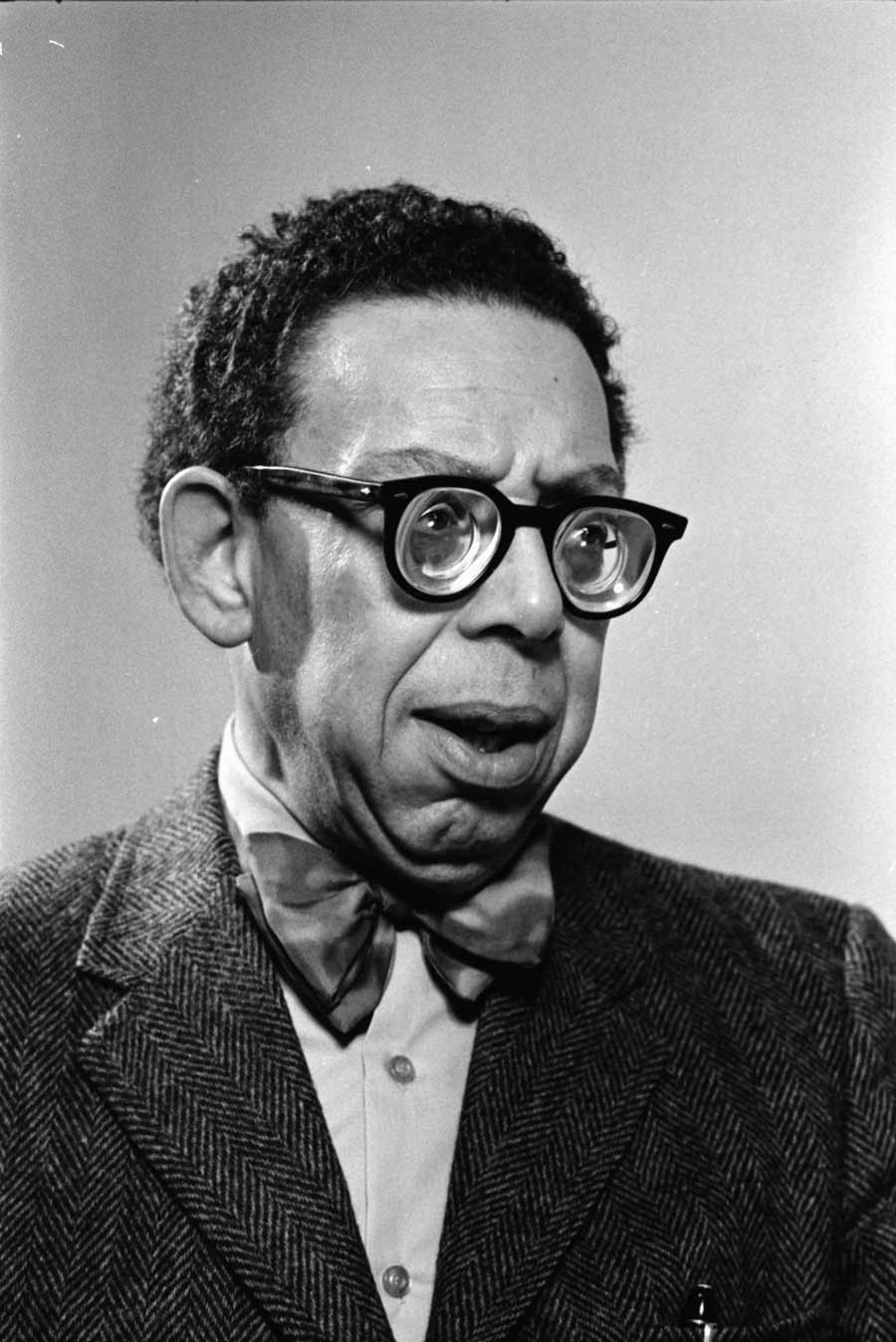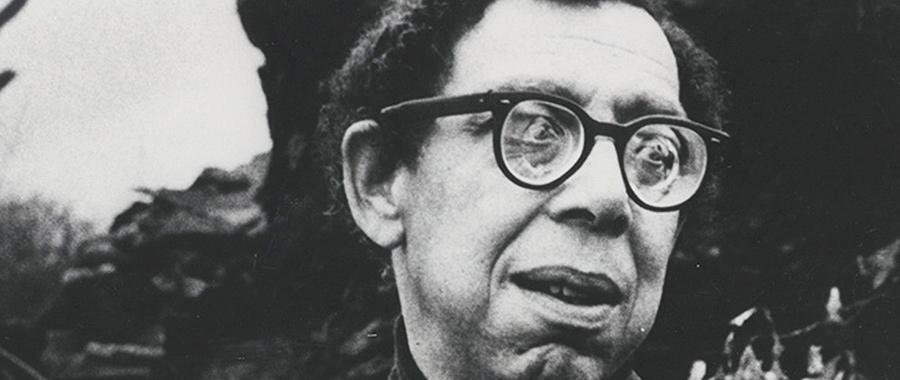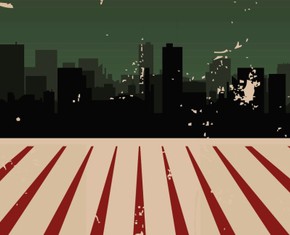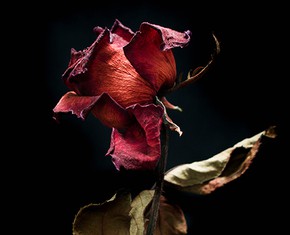The views expressed in our content reflect individual perspectives and do not represent the authoritative views of the Baha'i Faith.
Welcome to Uplifting the World of Being, a new series of articles where we’ll learn about Baha’is who left their mark on history through their creative and artistic pursuits:
Arts, crafts and sciences uplift the world of being, and are conducive to its exaltation. Knowledge is as wings to man’s life, and a ladder for his ascent. – Baha’u’llah, Epistle to the Son of the Wolf, p. 26.
Robert Earl Hayden became the poet laureate of Senegal in 1966—and ten years later became America’s first black poet laureate. He occupied that prestigious role for two terms, coinciding with America’s bicentennial in 1976, giving him the title “America’s Bicentennial Poet Laureate.”
Although he wrote some of the most powerfully acclaimed poems about black history ever written, Hayden faced severe criticism in his day for refusing to call himself a “Negro Poet.” Believing there was no such thing as black or white poetry, Hayden rejected efforts to typecast him as a “black artist,” and rejected the “tribalism of race consciousness” prevalent at that moment in time, opting for a Baha’i-inspired vision of racial unity and a focus on the human struggle for freedom that bridged the black/white divide.
Hayden’s profound poetry, the critics agreed, distinguished itself by fusing history with symbol, providing a gateway to the spiritual that illuminated truth and oneness.

Robert Earl Hayden
Robert Earl Hayden was born in a Detroit ghetto, ironically nicknamed “Paradise Valley,” on August 4, 1913. His birth parents gave him the name Asa Bundy Sheffrey, but due to their tumultuous and deteriorating marriage, Robert was raised by next-door neighbors Sue and William Hayden. They informally adopted him, giving him the name Robert Earl Hayden. He grew up impoverished in a predominantly black neighborhood, witnessing bigotry and racism from all sides. Because of his extreme near-sightedness and small stature, Hayden was often bullied and ostracized, so he turned to reading books rather than playing sports with his peers.
Hayden, the first in Paradise Valley to successfully graduate from high school, continued on to higher levels of education. He attended Detroit City College and left in 1936 to work for the Federal Writers’ Project, where he researched black history and folk culture. Hayden was heavily influenced by Harlem Renaissance poets such as Alain Locke, Countee Cullen and Langston Hughes, who would continue to inspire Hayden in throughout his career. In 1940, Hayden married his wife, Erma Inez Morris, the same year he published his first volume of poetry, Heart-Shape in the Dust, which won him his first award, the Summer Jules and Avery Hopwood Award. Morris, a music teacher and concert pianist, embraced the Baha’i Faith a year later in 1941. Hayden continued on to pursue his masters degree at the University of Michigan, studying under acclaimed British American poet W. H. Auden.
Following the completion of his graduate studies, Hayden taught for many years at both Michigan and Fisk University. In 1954 Hayden was awarded a Ford Foundation Fellowship, and in 1966 received a big break that would bring him international acclaim, when he was awarded by unanimous vote, the Grand Prix de la Poesie (Grand Prize for Poetry) at the pan-diaspora First World Festival of Negro Arts in Senegal, for his work A Ballad of Remembrance.
Hayden was granted the Russell Loines Award by the National Institute of Arts and Letters in 1970, and was nominated for a National Book Award in 1978 for his American Journal. Throughout his career, Hayden also held several academic posts as poet-in-residence, and as visiting poet at various American universities. From 1976-78, Hayden served as America’s Bicentennial Poet Laureate, consulting in poetry with the Library of Congress.
Hayden initially had little interest in the Baha’i Faith, but was often challenged by his wife, who urged him to further investigate. In his own time, he slowly learned more about the teachings of Baha’u’llah, and formally made the decision to become a Baha’i and enter the Baha’i community in 1943. Hayden said he became a Baha’i for several reasons:
… the belief in progressive revelation; the belief that the Baha’i teachings could effect the relationship between religious thought and scientific discovery necessary to a unified physical and metaphysical outlook; and, most important, the belief, in the transcendentalist principle of universal brotherhood. – Pontheolla T. Williams, Robert Hayden: A Critical Analysis of His Poetry, p. 26.
When you read Hayden’s poetry, you can clearly see, in several different ways, the influence of Baha’u’llah’s revelation:
One could be the general influence that took his work from social protest to a celebration of the Black American experience. Next would be the indirect references to the Baha’i Revelation or some aspect of it. These references and poems are not written for a Baha’i audience, for the meaning of the poem continues without the reader knowing the Baha’i reference. The Baha’i references add an another layer of meaning and depth to the poem for those familiar with the Baha’i Teachings. After that would come clear and direct references to some aspect of the Baha’i Faith. And, finally, the most direct reflection of the Revelation would be the incorporation of quotations from the Baha’ií Writings into the text of a poem. – Duane L. Herrmann, An Examination of the Poetry of Robert Hayden in Light of the Revelation of Baha’u’llah, 2010.
Hayden did not set out to consciously make references to the Baha’i Faith in his work, but the revelation no doubt naturally made its way into his poetry. The Baha’i Faith gradually became the lens through which he saw the world around him, and its teachings became a way to reconcile both his inner and outer realities. Hayden made several poetic references to the Baha’i Faith and its founder Baha’u’llah, through his use of symbols, analogies, titles, and direct references to quotes from the Baha’i writings, including the Hidden Words.
In a 1971 interview, a journalist asked “The reference to the Baha’i Faith in this poem (Full Moon) is one of many that appear in your poetry. How important are your religious beliefs to you as a poet?” Hayden answered:
As a Baha’i I am committed to belief in the fundamental oneness of all races, the essential oneness of mankind, to the vision of world unity. And these are increasingly powerful influences on my poetry today. – Ibid.
Hayden served the Baha’i community in various capacities, including the role of poetry editor for the quarterly World Order publication, a position which he retained until the end of his life. The poem which most directly refers to the Baha’i Faith, originally appeared in Hayden’s award winning Ballad of Remembrance, titled Baha’u’llah in the Garden of Ridvan. [the word Ridvan is Arabic for paradise] The poem speaks about the event which occurred in this garden in 1863, when Baha’u’llah first publicly announced that he was a messenger of God:
Baha’u’llah in the Garden of Ridvan
Agonies confirm His hour,
and swords like compass-needles turn
toward His heart,
The midnight air is forested
with presences that shelter Him
and sheltering praise
The auroral darkness which is God
and sing the word made flesh again
in Him.
Eternal exile whose return
epiphanies repeatedly
foretell
He watches in a borrowed garden,
prays. And sleepers toss upon
their armored beds,
Half-roused by golden knocking at
the doors of consciousness. Energies
like angels dance
Glorias of recognition.
Within the rock the undiscovered suns
release their light.
In a time fraught with segregation and division, Robert Hayden’s poetry took an imaginative leap into the consciousness behind historical events through themative movement, symbolism, compression and visual montages. His frequent use of nuanced irony, paired with both impeccable craftsmanship and technical details, resulted in poetic innovations.
Exploring racial identity and oppression, Hayden’s poetry was filled with emotional intensity, expressing both the anguish and the liberation of the human experience. Despite touching on racial themes, Hayden wanted his audience to focus on the black American experience as part of the greater human experience and struggle for freedom. He questioned and criticized notions of racial division that were so prevalent in his world, by integrating the spiritual and giving hope to the people of America, as the “People’s Poet.” He passed away at the age of 66 on February 25, 1980 and was laid to rest in Ann Arbor, Michigan.
















Comments
Sign in or create an account
Continue with Googleor